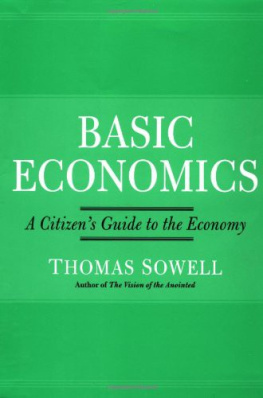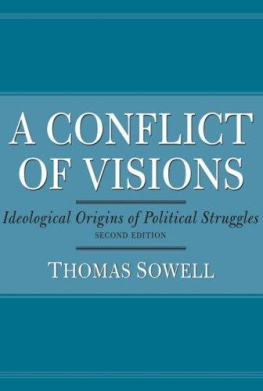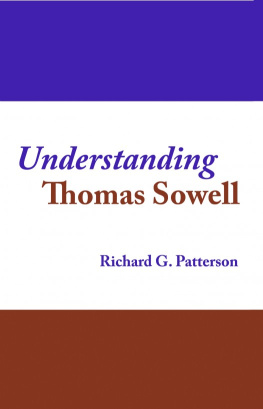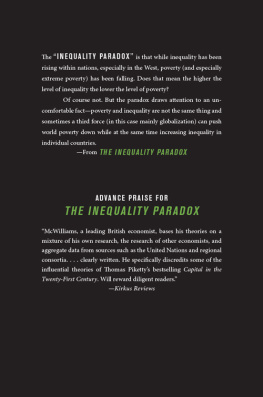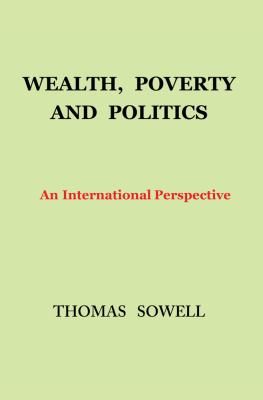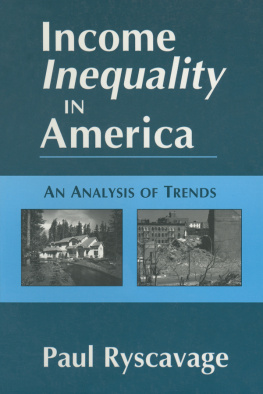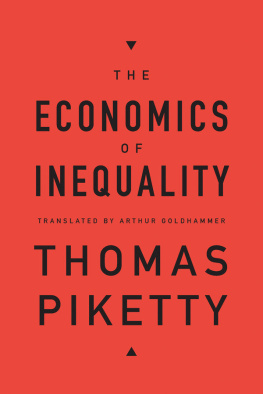
Copyright 2016 by Thomas Sowell
Published in the United States by Basic Books, an imprint of Perseus Books, a division of PBG Publishing, LLC, a subsidiary of Hachette Book Group, Inc.
All rights reserved. Printed in the United States of America. No part of this book may be reproduced in any manner whatsoever without written permission except in the case of brief quotations embodied in critical articles and reviews.
For information, address Basic Books, 250 West 57th Street, 15th Floor, New York, NY 10107.
Books published by Basic Books are available at special discounts for bulk purchases in the United States by corporations, institutions, and other organizations. For more information, please contact the Special Markets Department at the Perseus Books Group,
2300 Chestnut Street, Suite 200, Philadelphia, PA 19103,
or call (800) 810-4145, ext. 5000, or e-mail .
Library of Congress Control Number: 2016937086
A CIP catalog record for this book is available from the Library of Congress.
ISBN: 978-0-465-09677-0 (e-book)
10 9 8 7 6 5 4 3 2 1
CONTENTS
Facts are stubborn things; and whatever may be our wishes, our inclinations, or the dictates of our passions, they cannot alter the state of facts and evidence...
John Adams
B oth the first edition of this book and this revised and enlarged edition differ fundamentally from most other discussions of economic differences between nations and within nations. The many policy proposals for ending poverty, or reducing income gaps, disparities or inequities, which abound in other discussions of economic inequalities, will not be found here.
The humanitarian goals of these many policy proposals are important. But, precisely because those goals are so important, it is crucial that these proposals be based on an understanding of the actual facts about the causes and consequences of economic inequalities. This book seeks to clarify some of those causes and consequences. If this seems like a modest task, it is a task whose neglect has led to many plausible-sounding policies that turned out to be not only ineffective but painfully counterproductive and in some cases catastrophic. It is especially painful when policies to help the poor misfire and leave the poor worse off, since they have less margin with which to absorb the consequences of other peoples errors.
Many who are shocked and puzzled by large economic and other disparities between individuals, groups or nations have been driven to seek some single, key factor whether genetics, exploitation or whatever to explain why some are so prosperous and others so poor. The implicit assumption seems to be that people would not differ so much in their outcomes without some major differentiating factor, whether caused by genes or by human interventions that favor some at the expense of others. But where there are endeavors with great disparities in outcomes, that does not necessarily imply equally great disparities among the people engaged in that endeavor.
In many endeavors, there are multiple prerequisites for success, so that people with nine-tenths of those prerequisites need not be successful nine-tenths as often, but may in fact turn out to be utter failures. Because many economic and other endeavors require multiple factors, those individuals, groups or nations with most of those factors, but not all, can be poverty-stricken and backwards for generations or even centuries and then suddenly surge to the forefront of human achievements, after they acquire whatever remaining factor or factors might be required. Examples such as eighteenth century Scotland and nineteenth century Japan will be examined in the chapters that follow.
Conversely, a nation in the forefront of human achievements for centuries can lose just one of the prerequisites of success and fall far behind the economic and technological progress of many other nations that formerly lagged behind it. China, as we shall see, was an example of such a retrogression, which it is currently in the process of reversing again, as Chinas economic and technological levels are rising rapidly.
This is not a book written to celebrate, or to demonize, any particular racial or ethnic group, or any nation or civilization. It is an attempt to understand the effects of various factors that influence the economic fates of human beings in general. Rather than try to discuss such things in the abstract, hard facts about particular flesh-and-blood peoples are examined. Some of these facts may be inspiring and others appalling, but in neither case do these facts or factors provide a basis for grading or ranking whole peoples.
Even as we avoid attempting to grade or rank the intrinsic merits of whole peoples, caught in a web of surrounding geographic, historic and other circumstances they did not choose, and equipped with a culture they did not choose, inherited from ancestors they did not choose, we cannot go to the other extreme and pretend that all their achievements are equally valuable, or even approximately comparable. On the contrary, one of the things we can at least hope to accomplish is to gain some insights into which kinds of factors have promoted human achievements and progress, and which have led to suffering and ruin.
It so happens that the illustrations here involving Russians, for example, show various negative factors, but these illustrations cannot pretend to be a grading or ranking of Russians, which would require also considering many internationally recognized Russian achievements over the centuries in literature, music and other fields, as well as great courageous stands against tyrannies that have arisen in their country, such as the monumentally heroic example of Aleksandr Solzhenitsyn in our own times. But that would be a very different, and vastly larger, book. The task undertaken here is more limited, and much more within the limits of human understanding and the human life span.
One of the key implicit assumptions of our time is that many economic and social outcomes would tend to be either even or random, if left to the natural course of events, so that the strikingly uneven and non-random outcomes so often observed in the real world imply either some adverse human intervention or else some genetic differences in the people whose outcomes are so different.
Assumptions that remain implicit can escape scrutiny, even by people who build a whole structure of beliefs and imperatives on the foundation of such assumptions. With a decline of belief in genetic determinism, the implicit assumption of evenness or randomness of outcomes in the absence of human interventions has been enough to turn a search for causation into a search for blame. Declarations of blame may be in the raucous voices of street corner demagogues or in the hushed tones of learned judges in august judicial chambers. In many contexts, this has reduced explanatory options to blaming the victim or blaming presumed victimizers.
As a result, even among some academic scholars the search for truth has too often been narrowed to searching for blame or to taking sides. One small but revealing sign of this taking sides is blocking the release of data to people on the other side, who might use that data against our side whether the particular issue is affirmative action, global warming or whatever. More generally, taking sides can all too easily mean treating social issues involving the fate of millions of fellow human beings as if they were just intramural contests among intellectuals or politicians.
Yet, in the absence of the implicit assumption of evenness or randomness, a search for causation turns up many factors that are far from even or random, including geographic, demographic, cultural and political factors with great influence on outcomes, even if none of these factors may be enough to determine outcomes by itself. This book examines such factors, not exclusively, but in addition to other factors, including some for which human beings can be blamed, such as conquests and enslavement but with no presumption that those things which arouse our moral indignation have more causal weight than those things which we see as simply matters of fact. This does not imply moral neutrality, but simply a recognition that morality and causation are different things, and that the great importance of each is a reason to avoid confusing one with the other.
Next page


